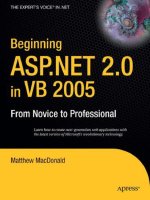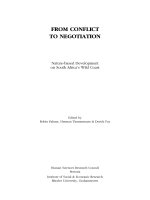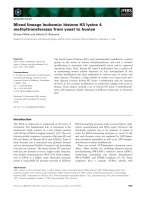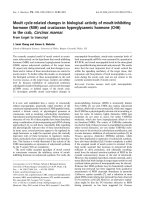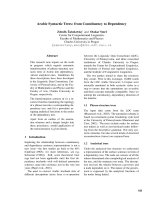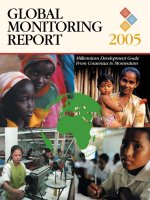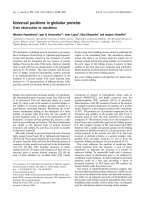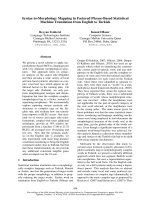The Network Society - From Knowledge to Policy ppt
Bạn đang xem bản rút gọn của tài liệu. Xem và tải ngay bản đầy đủ của tài liệu tại đây (1.9 MB, 460 trang )
Edited by
Manuel Castells and Gustavo Cardoso
C
T
R
The Network Society
From Knowledge to Policy
Edited by
Manuel Castells
Wallis Annenberg Chair, Professor of
Communication, Technology and Society,
University of Southern California, Los Angeles
and Research Professor; Open University of
Catalonia, Barcelona
Gustavo Cardoso
Professor of Information and Communication
Sciences, Department of Information
Sciences and Technology,
ISCTE, Lisboa,
Portugal
The Network Society
From Knowledge to Policy
The Network Society
From Knowledge to Policy
Edited by
Manuel Castells
Wallis Annenberg Chair Professor of
Communication Technology and Society
University of Southern California,
Los Angeles
and Research Professor,
Open University of Catalonia, Barcelona
Gustavo Cardoso
Professor of Information and Communication Sciences,
Department of Information Sciences and Technology,
ISCTE, Lisbon, Portugal
This book was published with the support of the
Presidência da República Portuguesa and of the
Fundação Luso Americana para o Desenvolvimento.
K85232_01.qxp 12/27/05 1:37 PM Page i
Castells, Manuel and Cardoso, Gustavo, eds., The Network Society:
From Knowledge to Policy Washington, DC: Johns Hopkins Center for
Transatlantic Relations, 2005
© Center for Transatlantic Relations, 2005
Center for Transatlantic Relations
The Paul H. Nitze School of Advanced International Studies
The Johns Hopkins University
1717 Massachusetts Ave., NW Suite 525
Washington, DC 20036, USA
Tel: (202) 663-5880
Fax: (202) 663-5879
Email:
ISBN
K85232_01.qxp 12/27/05 1:37 PM Page ii
This work is licensed under a Creative Commons Attribution-NonCom-
mercial-NoDerivs 2.5 License.
Table of Contents
List of Figures . . . . . . . . . . . . . . . . . . . . . . . . . . . . . . . . . . . . . . . . . vii
List of Tables . . . . . . . . . . . . . . . . . . . . . . . . . . . . . . . . . . . . . . . . . . ix
Notes on Contributors . . . . . . . . . . . . . . . . . . . . . . . . . . . . . . . . . . xi
Acknowledgments from President Jorge Sampaio . . . . . . . . . . xvii
Editor’s Preface . . . . . . . . . . . . . . . . . . . . . . . . . . . . . . . . . . . . . . . . xix
Part I: The Network Society: From Knowledge to Policy
Chapter 1
The Network Society: from Knowledge to Policy . . . . . . . . . 3
Manuel Castells
Chapter 2
Societies in Transition to the Network Society . . . . . . . . . . . 23
Gustavo Cardoso
Part II: The Knowledge Economy, Technology,
Innovation, Productivity, Competitiveness: The New
Productive Economy
Chapter 3
Information, Technology and the World Economy . . . . . . . 71
Dale W. Jorgensen and Khuong M. Vu
Chapter 4
Innovation, Technology and Productivity:
Why Europe Lags Behind the United States and Why
Various European Economies Differ in Innovation
and Productivity . . . . . . . . . . . . . . . . . . . . . . . . . . . . . . . . . . 125
Luc Soete
K85232_01.qxp 12/27/05 1:37 PM Page iii
Part III: Organizational Reform and Technological
Modernization in the Public Sector
Chapter 5
Central Issues in the Political Development of the
Virtual State . . . . . . . . . . . . . . . . . . . . . . . . . . . . . . . . . . . . . 149
Jane Fountain
Chapter 6
Uses of Internet and Mobile Technology in Health Systems:
Organizational and Social Issues in a Comparative
Context . . . . . . . . . . . . . . . . . . . . . . . . . . . . . . . . . . . . . . . . . 183
James Katz, Ronald E. Rice and Sophia Acord
Chapter 7
E-Learning and the Transformation of Education for a
Knowledge Economy . . . . . . . . . . . . . . . . . . . . . . . . . . . . . . 215
Betty Collis
Chapter 8
Reshaping the State and its Relationship with Citizens:
the Short, Medium and Long-term Potential of ICTs . . 225
Geoff Mulgan
Part IV: Media, Communication, Wireless and Policies
in the Network Society
Chapter 9
The IP TV Revolution . . . . . . . . . . . . . . . . . . . . . . . . . . . . . . . 241
Jonathan Taplin
Chapter 10
Television and Internet in the Construction of identity . . 257
Imma Tubella
Chapter 11
Geeks, Bureaucrats and Cowboys: Deploying Internet
Infrastructure, the Wireless Way . . . . . . . . . . . . . . . . . . . . 269
François Bar and Hernan Galperin
iv The Network Society
K85232_01.qxp 12/27/05 1:37 PM Page iv
Chapter 12
Free Software and Social and Economic Development . . . 289
Marcelo Branco
Part V: The Network Society: Global and Local
Chapter 13
Internet and Society in a Global Perspective:
Lessons from Five Years in the Field . . . . . . . . . . . . . . . . 305
Jeff Cole
Chapter14
E-topia: Information and Communication Technologies
and the Transformation of Urban Life . . . . . . . . . . . . . . . 325
William Mitchell
Part VI: Policies of Transition to the Network Society
Chapter 15
Challenges of the Global Information Society . . . . . . . . . . . 337
Pekka Himanen
Chapter 16
Policies of Transition to the Network Society in Europe . 373
Erkki Liikanen
Chapter 17
ICT as a Part of the Chilean Strategy for Development:
Present and Challenges . . . . . . . . . . . . . . . . . . . . . . . . . . . . 381
Carlos Alvarez
Chapter 18
The European Way to a Knowledge-Intensive Economy—
The Lisbon Strategy . . . . . . . . . . . . . . . . . . . . . . . . . . . . . . 405
Maria João Rodrigues
Afterword: The Network Society and the Knowledge Economy:
Portugal in the Global Perspective . . . . . . . . . . . . . . . . . . . . 425
Jorge Sampaio
K85232_01.qxp 12/27/05 1:37 PM Page v
K85232_01.qxp 12/27/05 1:37 PM Page vi
Figures
Figure 2.1—Businesses using the Internet and businesses receiving
orders over the Internet, percentage of businesses with ten or more
employees, 2002 and 2003 or latest available year
1
Figure 3.1—Sources of Output Growth by Group of Economies
Figure 3.2—Capital Input Contribution to Growth by Group of
Economies
Figure 4.1—EU and US firms’ renewal in the post-war period
Figure 4.2—Gap in the EU25—US R&D Spending
Figure 4.3—S&E as % of Labor Force (growth rates 1995-2000)
Figure 4.4—Regulatory Barriers Index (OECD)
Figure 5.1—The Technology Enactement Framework
Figure 5.2—Key Actors in Technology Enactment
Figure 5.3— OMB Office of E-Government and Information
Technology Organization Chart
Figure 5.4— U.S. Federal Government IT Spending
Figure7.1—E-learning in terms of content and communication with
communities of practice representing the intersection of the richest
forms of each
Figure 9.1—Analog to Digital Transition
Figure 9.1—Nevius Media Center Server
Figure 9.2—Media Center Control System
Figure 9.4—U.S. Cable Capital Expenditures
Figure 9.5—Monthly Download Performance of Rhapsody
Figure 13.1—Number of hours of watched television per user and
non user of internet
Figure 13.2—Changes in time of watched television per user and non
user of internet
Figure 13.3—How important is the Internet for Information
purposes.
Figure 13.4—How trustful is the information on the Internet.
Figure 13.5—Does the Internet improve your productivity at work?
Figure 13.6—how frequently Internet users check their e-mail
Figure 13.7—Frequency in replying to their e-mail
Figure 15.1—Global Challenges to the Information Society
Figure 15.2—The pyramid of values from the psychological
perspective.
K85232_01.qxp 12/27/05 1:37 PM Page vii
Figure 15.3—Innovation factors
Figure 15.4—An economy based on extensive creativity and expertise.
Figure 15.5—The purchaser–provider model.
Figure 15.6—The proportion of the foreign population in different
countries in 2000 (%).
viii The Network Society
K85232_01.qxp 12/27/05 1:37 PM Page viii
Tables
Table 2.1—Technological Achievement Index (2001)
Table 2.2—International Comparisons in the Field of Technology
Table 2.3—Use of the Internet per Country according To User’s
Highest Education Level (%)
Table 2.4—Internet Use Rates in the Population with Secondary And
Higher Education (%)
Table 2.5—Internet Access/Use of Access Ratio
Table 2.6—Percentage of Citizens per Age Group that have
completed Secondary and Tertiary Education in Selected Countries
Table 2.7—Use of the Internet by Age Interval per Country (%)
Table 2.8—International Comparison of Internet Use per Age Group
(%)
Table 2.9—International Comparison of Informational Development
Indicators
Table 2.10—Position of the Information Economies Under Analysis
Table 2.11—Growth Competitiveness Index (Gci)
Table 2.12—International Comparison of Citizenship Indicators
Table 2.13—International Comparison of Social Well-Being
Indicators
Table 2.14—Civic Engagement in European Countries (%)
Table 2.15—Participation over Time in Established and New
Democracies
Table 2.16—Signed Petition in the last 12 Months, according to
Highest Education Level (%)
Table 2.17—Contacted Politicians/Government Members in the last
Year, By Education Level (%)
Table 2.18—Relationship Between Watching TV News And Reading
Newspapers, by Education Level/Country (%)
Table 3.1: The World Economy: Shares In Size and Growth by
Region And Individual Economy
Table 3.2: Levels of Output And Input Per Capita And Productivity
Table 3.3: Sources of Output Growth: 1995-2001 vs. 1989-1995
Table 5.1— Cross-Agency, E-Government Initiatives
Table 5.2— Presidential Management Initiative E-Government
Projects: Partner Agencies and Managing Partners
Table 7.1 Relevant Characteristics of The Worlds
K85232_01.qxp 12/27/05 1:37 PM Page ix
Table 9.1—Downward Internet Streaming Costs
Table 9.2—Pvr Penetration and Commercial Skipping Estimates
Table 11.1— “Top 10” Wireless Internet Service Providers
Table 15.1— Cultural Sector Global Business (USD billions)
Table 16.1— Digital Agenda: 34 Initiatives (2004–2006)
Table 17.1— Lisbon Strategy
xThe Network Society
K85232_01.qxp 12/27/05 1:37 PM Page x
Notes on Contributors
Jorge Sampaio was born in Lisbon on September 18th 1939. In 1961
he graduated in Law—Lisbon University. Whilst at university he was
involved in various academic activities that marked the start of a persist-
ent political action against the dictatorship. In 1995, Jorge Sampaio
stood for the presidential elections. He enjoyed the support of personal-
ities, both independent and from other political areas, who played sig-
nificant roles in the political, cultural and economic life of the country.
On January 14th 1996 he was elected on the first ballot. He was sworn
in as President of the Republic on March 9th. He ran for a second term
of office and was re-elected on the first ballot on January 14th 2001, for
another five-year term. In 1991 he published a collection of his political
essays entitled A Festa de um Sonho.” In 1995 a new work of his was
published under the title Um Olhar sobre Portugal, setting out his views
on domestic problems in response to concerns expressed by Portuguese
opinion-makers in various areas of society. In 2000 he published a book
called Quero Dizer-vos, in which his present views on the challenges
faced by the Portuguese society are laid out. His presidential speeches
have been published in a series intitled Portugueses.
Manuel Castells is the Wallis Annenberg Chair Professor of
Communication Technology and Society at the Annenberg School of
Communication, University of Southern California, Los Angeles. He
is also Research Professor of Information Society at the Open
University of Catalonia (UOC) in Barcelona, professor Emeritus of
Sociology and of Planning, at the University of California at Berkeley
and Distinguished Visiting Professor of Technology and Society at the
Massachusetts Institute of Technology.
Gustavo Cardoso is an associated researcher at CIES/ISCTE and
Professor of Technology and Society at ISCTE in Lisbon. He also col-
laborates with the Department of Communications and Performance
Studies of the University of Milan and with the Portuguese Catholic
University. His international cooperation in European research net-
works brought him to work with IN3 (Internet Interdisciplinary
Institute) in Barcelona, COST A20 “The Impact of the Internet in
Mass Media” and COST A24 “The Evolving Social Construction of
Threats.” Since 1996 he is adviser on Information Society and
telecommunications policies for the Portuguese Presidency.
K85232_01.qxp 12/27/05 1:37 PM Page xi
Dale W. Jorgenson is the Samuel W. Morris University Professor at
Harvard University. He received a BA in economics from Reed
College in Portland, Oregon, in 1955 and a PhD in economics from
Harvard in 1959. After teaching at the University of California,
Berkeley, he joined the Harvard faculty in 1969 and was appointed the
Frederic Eaton Abbe Professor of Economics in 1980. He has directed
the Program on Technology and Economic Policy at the Kennedy
School of Government since 1984 and served as Chairman of the
Department of Economics from 1994 to 1997.
Khuong M. Vu is visiting Assistant Professor of Finance at the School
of Management at Suffolk University. He is a PhD candidate at
Harvard University, Kennedy School of Government Dissertation:
“Information and Communication Technology and Global Economic
Growth: Contribution, Impact, and Policy Implications.” His BA was
obtained at Hanoi National University, Vietnam. His professional activ-
ities include being Senior Advisor, Development Alternative Inc./On
the Frontier Advised the Vietnam Competitiveness Initiative Project,
funded by USAID to enhance Vietnam’s international competitiveness
and global integration, Senior Consultant, World Bank, Summer 2003,
for survey of key participants in the Sister City and Development
Partnership between Seattle, WA and Haiphong, Vietnam; Former
Project Leader, MPDF/IFC, Vietnam; Former Strategy Analyst, Prime
Minister’s Advisory Council, Vietnam; Former Chief Economic Adviser
and Deputy Chief of City Government Office, Vietnam.
Luc Soete is joint Director of the United Nations University
Institute for New Technologies (UNU-INTECH) and the Maastricht
Economic Research Institute on Innovation and Technology
(MERIT). He is Professor of International Economics (on leave) at
the Faculty of Economics and Business Administration, University of
Maastricht. Since January 2004, he is also member of the Dutch
Adviesraad voor Wetenschap en Technologie (AWT).
Jane Fountain is Associate Professor of Public Policy at the John F.
Kennedy School of Government at Harvard University. She is also
founder and Director of the National Center for Digital Government,
and Co-Chair of the Information, Technology and Governance Faculty
Group. Her research is focused at the intersection of institutions, global
information and communication technologies, and governance.
Fountain is the author of Building the Virtual State: Information Technology
xii The Network Society
K85232_01.qxp 12/27/05 1:37 PM Page xii
and Institutional Change (Brookings Institution Press, 2001), which was
awarded an Outstanding Academic Title 2002 by Choice, and Women in
the Information Age (Cambridge University Press, forthcoming).
James Katz is professor of communication at Rutgers, The State
University of New Jersey. Currently he is investigating how personal
communication technologies, such as mobile phones and the Internet,
affect social relationships and how cultural values influence usage pat-
terns of these technologies. Prof. Katz has had a distinguished career
researching the relationship among the domains of science and tech-
nology, knowledge and information, and social processes and public
policy. His award-winning books include Perpetual Contact: Mobile
Communication, Private Talk and Public Performance (co-edited with
Mark Aakhus), Connections: Social and Cultural Studies of the Telephone in
American Life, and Social Consequences of Internet Use: Access,
Involvement, Expression (co-authored with Ronald E. Rice).
Ronald E. Rice is the Arthur N. Rupe Professor in the Social Effects
of Mass Communication at the University of California, Santa
Barbara, USA. He is the author of widely cited books and articles in
communication and information sciences. Dr. Rice received his Ph.D.
from Stanford University. Before coming to UCSB, he was the chair
of the Department of Communication at Rutgers University.
Sophia K. Acord is pursuing her doctorate in the sociology of art at
the University of Exeter in Britain. Her current work focuses on cul-
tural aspects of the distribution of power. She has previously co-
authored articles with Profs. Katz and Rice in the area of social
consequences of communication technology.
Betty Collis is head of the research team “Technology for Strategy,
Learning and Change” in the Faculty of Behavioural Sciences at the
University of Twente in The Netherlands. As leader of a five-year col-
laborative research project with the Learning and Leadership
Development organization of Shell International Exploration and
Production (Shell EP-LLD), she is also head of the research team for
Shell EP-LLD. In both roles she studies changes in organizations
related to their use (or non-use) of technologies.
Geoff Mulgan is the director of the Institute of Community Studies
in east London, which had been the main vehicle through which Lord
Michael Young created over 60 organizations including the Open
Notes on Contributors xiii
K85232_01.qxp 12/27/05 1:37 PM Page xiii
University and the Consumers Association. He has also become a vis-
iting professor at LSE and UCL, and a senior fellow at the Australia
New Zealand School of Government. Between 1997 and 2004 he had
a number of roles in government: he established and directed the gov-
ernment’s Strategy Unit and served as head of policy in the Prime
Minister’s office. Before that he was founder and director of Demos,
described by the Economist as the UK’s most influential think-tank;
chief adviser to Gordon Brown MP; a consultant and lecturer in
telecommunications; and an investment executive. He began his
career in local government in London.
Marcelo Branco is an advisor to the Presidency of the Brazilian
Republic for the Information Society. He is also the coordinator of
the “Projeto Software Livre Brasil” (www.softwarelivre.org). In his
academic work he has collaborated with the University of Cadiz
(Spain), he is honorary professor at the Instituto Superior Tecnológico
CEVATEC in Lima (Perú) and a member of the scientific council of
the International Master in Free Software of the Universitat Oberta
de Catalunya (UOC, Open University of Catalonia, Spain).
Jonathan Taplin is Adjunct Professor at USC Annenberg School of
Communication. His Areas of specialization are in International
Communication Management and the field of digital media entertain-
ment. Taplin began his entertainment career in 1969 as Tour Manager
for Bob Dylan and The Band. In 1973 he produced Martin Scorsese’s
first feature film, Mean Streets which was selected for the Cannes
Film Festival. In 1984 Taplin acted as the investment advisor to the
Bass Brothers in their successful attempt to save Walt Disney Studios
from a corporate raid. This experience brought him to Merrill Lynch,
where he served as vice president of media mergers and acquisitions.
Taplin was a founder of Intertainer and has served as its Chairman and
CEO since June 1996. Intertainer was the pioneer video-on-demand
company for both cable and broadband Internet markets.
Imma Tubella is Professor of Communication Theory and Vice-rec-
tor for Research at the Open University of Catalonia (UOC),
Barcelona. Her research interests concern the relationship between
media and identity. She is a member of the Board of the Catalan
Broadcasting Corporation. Among other publications, she is a co-
author of La Societat Xarxa a Catalunya (2003).
xiv The Network Society
K85232_01.qxp 12/27/05 1:37 PM Page xiv
Francois Bar is Associate Professor of Communication in the
Annenberg School for Communication at the University of Southern
California. He is a steering committee member of the Annenberg
Research Network on International Communication. Prior to USC,
he held faculty positions at Stanford University and at the University
of California at San Diego. Since 1983, he has been a member of the
Berkeley Roundtable on the International Economy (BRIE), at UC
Berkeley, where he previously served as program director for research
on telecommunications policy and information networking. He has
held visiting faculty appointments at the University of Toronto, the
University of Paris-XIII, Théséus, and Eurécom.
Hernan Galperin is an Assistant Professor at the Annenberg School
for Communication, University of Southern California. He holds a
B.A. in Social Sciences from the University of Buenos Aires, Argentina,
and a Ph.D. from Stanford University. Dr. Galperin’s research and
teaching focus on the international governance and impact of new
communication and information technologies. His research has been
published in article collections and scholarly journals such as the
Federal Communications Law Journal, Telecommunications Policy,
the Journal of Communication, and Media, Culture, & Society. His
new book, New TV, Old Politics (Cambridge University Press, 2004)
examines the political economy of digital TV in the U.S. and Europe.
He is currently working on a project that examines the impact of new
wireless networking technologies such as Wi-Fi in developing nations.
Jeff Cole joined the USC Annenberg School for Communication as
Director of the newly formed Center for the Digital Future and as a
Research Professor. Prior to joining USC, Cole was a longtime mem-
ber of the UCLA faculty and served as Director of the UCLA Center
for Communication Policy, based in the Anderson Graduate School of
Management. At UCLA and now at USC Annenberg, Cole founded
and directs the World Internet Project, a long-term longitudinal look
at the effects of computer and Internet technology on all aspects of
society, which is conducted in over 20 countries. At the announcement
of the project in June 1999, Vice President Al Gore praised Cole as a
“true visionary providing the public with information on how to
understand the impact of media.”
William Mitchell is Academic Head of the Program in Media Arts
and Sciences, Professor of Architecture and Media Arts and Sciences,
and holds the Alexander W. Dreyfoos, Jr. (1954) Professorship at the
Notes on Contributors xv
K85232_01.qxp 12/27/05 1:37 PM Page xv
Media Lab. Formerly Dean of the School of Architecture and
Planning at MIT, he also directs the Media Lab’s Smart Cities
research group, and serves as architectural adviser to the President of
MIT. Mitchell is currently chair of The National Academies
Committee on Information Technology and Creativity.
Erkki Liikanen born in Mikkeli, Finland in 1950. Has a Master in
political and economical sciences by the University of Helsinki. Since
July 2004 he is Governor of the Bank of Finland. Between 1999 and
2004 he was a member of the European Commission for Enterprises
and Information Society.
Pekka Himanen divides his time between the Helsinki Institute for
Information Society and the University of California at Berkeley. He
has also acted as an advisor on the information society to the Finnish
President, Government and Parliament. His books on the network
society have been published in twenty languages. They include The
Hacker Ethic and the Spirit of the Information Age (2001) and (with
Manuel Castells) The Information Society and the Welfare State: The
Finnish Model (2001).
Carlos Alvarez is Secretary of State for the Economy in the Chilean
Government. Born in Punta Arenas, in 1962. He is an civil engineer
and has a Master in Public Administration from Harvard University. He
taught economy at the Universidad de Chile between 1989 and 1993.
Maria João Rodrigues is a Full Professor of Economics at the Uni-
versity of Lisbon, Instituto Superior de Ciências do Trabalho e da
Empresa (ISCTE), University of Lisbon. Other current activities are:
President of the European Commission’s Advisory Group for Social
Sciences (6th Framework Programme of R&D); Special Adviser to the
Luxembourg Presidency of the European Union, in charge of the
Mid-term Review of the Lisbon Strategy; Member of the Board of the
European Policy Centre Council, Brussels;Member of the Board of
“Notre Europe,” Paris. recent activities developed in the last five years in-
clude being a Member of the Group of Economic Analysis supporting
the President of the European Commission (2003-2004); Member of the
High Level Group on the Future of European Social Policies, European
Union (2003-2004); Member of the High Level Group on Information
Society, European Union (2003-2004); Member of the European
Employment Task Force, European Union (2003); General rapporteur
for the Global Employment Forum, ILO, United Nations (2001); Member
of OECD network of government long-term strategists (2000).
xvi The Network Society
K85232_01.qxp 12/27/05 1:37 PM Page xvi
Acknowledgements
Although dealing with the wide-ranging and manifold tasks and
duties that are part of the everyday work of the President of the
Portuguese Republic, I have continued to reflect, in recent years, on
the nature and direction of the movement that interlinks the informa-
tion society, the knowledge economy and the network society. Where
is it taking us? What demands does it make of the economic agents
and political decision makers? How does it affect our daily lives and
the way in which we define the everyday horizons of our citizens?
It so happens that the speed at which these developments are taking
place is so vertiginous and the work carried out by analysts to come to
a proper understanding of what is going on are so intense, that com-
plying with the duty of the President of the Republic—i.e., accompa-
nying and trying to understand the changes going on around us—is
not easily compatible with the performance of the normal tasks and
duties that come with the office.
In these conditions, taking time out to think is a necessity that
makes good common sense. This thinking will be all the more prof-
itable done in the company of those who are best prepared to reflect,
with the support of solid theoretical and empirical foundations, on
social transformation.
Indeed: stopping to think, one more time, on the limitations and
opportunities of our societies in the global context of network soci-
eties, was what I decided to do. In this, I have been truly privileged to
be able to rely on the support of Professor Manuel Castells, who is,
without doubt, one of the most brilliant and acknowledged theorists
on social change in the digital era.
During the two days of intense work at the conference organized
by Professor Castells, with the support of Professor Gustavo Cardoso,
it was possible, thanks to the quality of the national and foreign spe-
cialists attending—and I would like to take the occasion of the publi-
cation of their contributions to thank them once again for their
participation—to present and discuss updated perspectives on the
main trends towards development of the network society and its pol-
icy dimension. This was achieved without neglecting the fact that
K85232_01.qxp 12/27/05 1:37 PM Page xvii
these trends are realized at different speeds and in very different pat-
terns in different countries and areas of social life.
From the contributions made and debates held at the conference,
and now published in this volume, it is reasonable to conclude that
some of the perplexities aroused in this respect by the Portuguese,
North American, Finnish, Chilean, Brazilian, UK, Spanish and
Catalonian, Dutch, Belgium and other European and Worldwide cases
here addressed are common to other societies, albeit at different levels.
Sharing this knowledge and comparing different realities is a necessary
condition to the development of policies and their implementation in
the world we live in. I hope this book might contribute to a better pol-
icy making in the network society and knowledge economy.
Jorge Sampaio, President of the Portuguese Republic
xviii The Network Society
K85232_01.qxp 12/27/05 1:37 PM Page xviii
Editor’s Preface
This volume explores the patterns and dynamics of the network
society in its policy dimension, ranging from the knowledge eco-
nomic, based in technology and innovation, to the organizational
reform and modernization in the public sector, focusing also the
media and communication policies. The Network Society is our soci-
ety, a society made of individuals, businesses and state operating from
the local, national and into the international arena. Although our soci-
eties have many things in common they are also the product of differ-
ent choices and historical identities. In this volume we chose to focus
both what we have considered to be already network societies and also
those who are going through a transition process. Accepting the invi-
tation from President Jorge Sampaio to discuss the knowledge econ-
omy and the network society from a policy point a view was a
challenge that we and the different authors that have contributed to
this book believe was worth it.
Policy is usually a strategic choice in order to deal either with
uncertainty or with the reality already faced by populations or coun-
tries, in our times policy making is becoming increasingly important
and at the same time more difficult.
What defines the collective research effort presented in this book is
the conviction that the difficulty is probably more a result of the
change, and consequently the need to understand what that change is,
rather than of an increasingly difficulty of issues and problems. This
volume is a small contribution for a better understanding of our soci-
eties, both those in transition and those already on the doorsteps of a
network society.
The perspective of this book is cross cultural. A perspective drawn,
not just by the diversity of geographical origins of its participants, but
due to the very own thematic and the geographical scope that we tried
to achieve. This is a book that focus on the transition societies of
Portugal, Spain—and its different autonomies, Italy, Greece, Poland,
Hungary, Czech Republic, Slovakia, Brazil, Argentina, Uruguay and
Chile. This is also a book where the comparison of those transition
societies with societies, where the network relations that characterize
K85232_01.qxp 12/27/05 1:37 PM Page xix
informational societies, is present. So this book focuses on informa-
tional societies like the US, Finland, UK and several other members
of the more developed countries in the European Union and how pol-
icy is being developed.
The volume begins with Manuel Castells and Gustavo Cardoso
contextualization of the network society in its different dimensions,
from knowledge to policy and from those societies in transition to the
Network Society to the already advanced informational societies. Part
II analyzes the knowledge economy, technology, innovation, produc-
tivity, competitiveness: the new productive economy. Dale W.
Jorgenson and Khuong Vu focus on the information technology and
its relationship with the world economy, analyzing the impact of
investment in information technology (IT) equipment and software
on the world economy. Following Dale Jorgenson’s detailed overview
of the evidence on international comparisons among the G-7 nations
in productivity growth, Luc Soete tries to answer why “Europe Lags
Behind the United States and Why Various European Economies
Differ in Innovation and Productivity,” focusing on the need to better
understand the precise relationship between ICT and the overall pol-
icy framework for the European economies.
Part III focuses on organizational reform and technological mod-
ernization in the public sector. The chapter starts with Jane Fountain’s
analysis of the Virtual State, a term that is a metaphor meant to draw
attention to the structures and processes of the state that are becom-
ing more and more deeply designed with digital information and com-
munication systems. Jane Fountain focuses her approach on the
discussion of the technology enactment framework, an analytical
framework to guide exploration and examination of information-based
change in governments focusing on current initiatives in the U.S. fed-
eral government to build crossagency relationships and systems. In a
different policy domain, James Katz analyses the role of the Internet
in providing an opportunity to the public and healthcare professionals
to access medical and health information, improve the efficiency and
effective, timely healthcare stressing that important empirical ques-
tions remain to be answered at every level about how effective these
systems are, how people in various socio-demographic sectors actually
use these systems, what their different effects are on those sectors, and
whether their expense justifies the efforts involved. Betty Collis’
xx The Network Society
K85232_01.qxp 12/27/05 1:37 PM Page xx
analysis of education is another contribution to this chapter where she
stresses the major changes that are occurring in society in the ways in
which we work and interact with each other, focusing on several of the
main characteristics of functioning productively in a knowledge econ-
omy and give some examples of how these characteristics can relate to
transformations in educational processes in the corporate setting, for
ongoing professional education, and in higher education. This chapter
ends with Geoff Mulgan’s account of both international and UK expe-
rience in policy making in the information age and aims to show that
the question of e-government is inseparable from broader questions of
government: how it is evolving, in response to what forces, with what
tools, and taking what shapes. I suggest a framework for assessing
impacts in terms of public value.
Part IV deals with another area of policy, that of media, communi-
cation, wireless and policies in the network society. In this chapter
Jonathan Taplin outlines the critical transition from a media world of
analogue scarcity (a limited number of broadcast channels) to the
coming world of digital abundance where any maker of content (films,
music, video games) could have access to the world’s audience through
a server based on demand media environment. His analysis seeks to
clarify what the new environment would look like and how the transi-
tion to IPTV could aid all of the existing media stakeholders. Taplin
suggests that the new environment would also enable an explosion of
creativity as the distribution bottleneck that has existed for one hun-
dred years of media history could be unlocked.
Focusing on Identity, another dimension of the media policies,
Imma Tubella suggests that while traditional media, in special televi-
sion, play an enormous role in the construction of collective identity,
Internet influences the construction of individual identity, as individu-
als increasingly rely on their own resources to construct a coherent
identity for themselves in an open process of self formation as a sym-
bolic project through the utilization of symbolic materials available to
them. The logic of Internet suggests a definition of self whose key
quality is not so much being closed and isolated as being connected.
Bringing into the discussion the need to address the choices of
technology at the policy level, François Bar and Hernan Galperin
focus on the infrastructure dimension and its social implications while
analyzing the deployment of wireless communication infrastructure,
Editor’s Preface xxi
K85232_01.qxp 12/27/05 1:37 PM Page xxi
stressing the differences between the wireless and the traditionally big
infrastructures investment programs undertaken by large entities such
as telecommunications operators and government agencies. They sug-
gest that three parallel trends are converging to permit departure
from that tradition: the emergence of more flexible spectrum policies,
which has removed regulatory barriers to entry; the advent of new
wireless technologies, which has fundamentally changed the cost
equation in favour of wireless solutions; and the entrance of many
small business and non-profit actors eager to play new roles in the
creation and management of wireless communication networks.
The chapter ends with another policy area, that of software, where
Marcelo Branco analyzes free software role on our societies and the
implications of following just one trend: that towards universal access
of the population to the worldwide computer network with technolo-
gies we do not master and contents we have no influence on guaran-
tees neither digital democratization nor the socialization of the
economic and social benefits provided by the technological advances.
Marcelo Branco defends that the high cost of the software used in
computers and the barrier to free scientific and technological knowl-
edge imposed by proprietary licences have hindered and even pre-
vented some regions of the world from benefiting from this revolution
in order to provide better quality of life for their citizens.
Part V focuses the need to network knowledge both at the global
and local level in order to achieve better policies. Jeff Cole, coordina-
tor of The World Internet Project (WIP), argues that since television was
the one mass medium expected to be a mass medium, a panel study
should have commenced in the late 1940s as the United States and
much of Western Europe and Asia acquired television. A long-term
study of individuals as they became television users would have done
much to answer some fundamental questions about the rise of televi-
sion and its effects on the audience. Such a study also could have doc-
umented television’s effects on consumer behavior to determine
whether and how it affected consumer purchases, connection to the
civic process, desire to travel, career aspirations and much else. Cole
argues that we currently need to focus on the uses of Internet in order
to understand better our present and consequently be able to design
more coherent and social and economic policies adapted to the com-
munalities and differences that cross our societies. William Mitchell,
xxii The Network Society
K85232_01.qxp 12/27/05 1:37 PM Page xxii
in a different, but complementary approach, focuses on the local, ana-
lyzing what kinds of buildings are required by the network economy
and the knowledge society. How should these be distributed spatially
within a city?
The final chapter of the book focuses on the policies of transition
to the network society. Pekka Himanen looks at the challenges that
are going on in the information society and their future evolution on a
medium term trend, giving particular emphasis on the situation in
Finland and Europe. For Himanen, the most critical aspect in the
development of the information society is the development of the deep-
set structures of society, to which we must now pay close attention,
stressing that the development of technology will help only when it is
combined with changes in the underlying structures.
Erkki Liikanen’s contribution focuses on the European Union poli-
cies, namely, why it is important to increase productivity and innova-
tion in Europe across all industry and service sectors, what is the key
role ICTs play in improving Europe’s economy and how the European
Union stimulates this through the eEurope 2005 Action Plan and
what should be the political approach to sustain the development of
the broadband market. Focusing on South America, namely Chile,
Carlos Alvarez analyzes the incorporation of Information and
Communications Technologies (ICTs) as a key component of Chile´s
strategy for economic growth and social development, giving a con-
text of the global impact of ICT to later concentrate on how ICTs
have been embraced as a government initiative in Chile. We then
return again our attention to Europe with a contribution by Maria
João Rodrigues that asks, “What Europe do we want and for what?”
Her argument is that the traditional discourses focusing on the need
to ensuring peace within borders are no longer working, namely for
the younger generations who take this for granted. Given that, we
need a more forward-looking approach to the European citizens aspi-
rations by focusing on sustaining their living conditions in a global
economy, making Europe a stronger player in improving global gov-
ernance and creating a more democratic and effective political system.
The paths and objectives for Europe are here discussed under the
framework of the Lisbon Strategy.
Finally, Jorge Sampaio, President of the Portuguese Republic,
responsible for the fostering of this book by inviting the different
Editor’s Preface xxiii
K85232_01.qxp 12/27/05 1:37 PM Page xxiii
scholars and politicians that contributed to this fruitful exchange of
ideas and analysis, provides what he suggests to be guidelines for
enacting policies in the Information Age. For Jorge Sampaio, in this
context, the clear formulation of strategic guidelines and, above all,
making decisions at the right time and on the basis of knowledge of
the current economic and social trends are absolutely crucial for stim-
ulating and monitoring the necessary changes. In other words: full
exploitation of the information technologies with a view to moderniz-
ing companies, the public administration and the state itself can only
be achieved if, before this, in each one of the principal fields of eco-
nomic and social life, the main barriers associated with the conven-
tional organizational models and modes of operation are examined.
Without organizational innovation, technological innovation will
never constitute a development factor and effective source of competi-
tiveness. Jorge Sampaio argues that in countries characterized by high
degrees of dualism and asymmetry, the role of the state in creating the
infrastructural and support conditions for industrial activity, paying
particular attention to the universe of the small and medium-sized
enterprises, becomes perhaps even more indispensable than in other
contexts. However, state intervention, though necessary, is far from
enough. The role of the business community is indispensable in
preparing any national economy for successful entry into the age of
the information society and globalization. This is because, in the final
analysis, it is the enterprises that, depending on a given institutional
framework and the stock of skills available in the employment system,
will actively contribute to adding vale to the wealth accumulated by
an economy.
This is a book on knowledge and policy, two ends of the same
process of managing our lives. Only their fruitful combination can
allow a better understanding and a better life for our societies. That is
the challenge of the network society.
Gustavo Cardoso and Manuel Castells
xxiv The Network Society
K85232_01.qxp 12/27/05 1:37 PM Page xxiv


